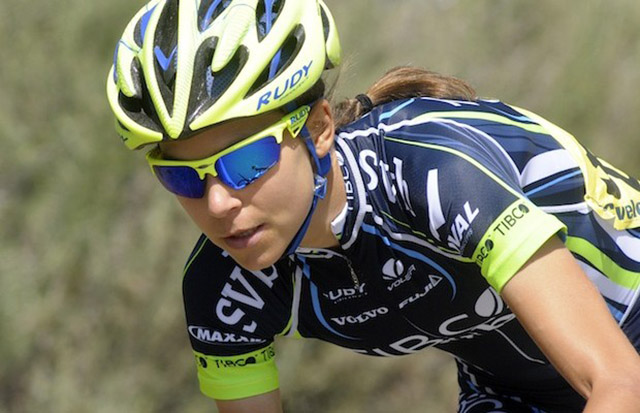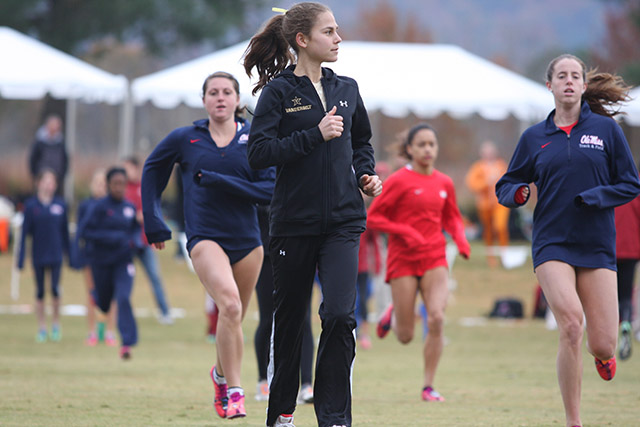Dec. 16, 2015

Photo credits: Tenspeedhero.com (outside) and VeloImages/Brian Hodes (above)
Former cross country/track standout Kristabel Doebel-Hickok graduated from Vanderbilt in 2011 with an economics degree. Doebel-Hickok, who set the then-school record in the 10,000 meters, lives back in her hometown of Marina del Ray, Calif. Most of her time is spent as a professional cyclist. She recently won a mountain stage in France – her second stage victory of the year — and competes with Team TIBCO. The team competes throughout the United States and internationally. Her 2015 season began in Argentina and ended in Europe. When she is not on the bike, she writes for nuphoriq.com, which specializes in marketing for catering and event planning companies.
How long have you been cycling?
I bought my first road bike just after graduating from college. My first race was in February 2012 — the Cat 3/4 Boulevard Road Race. I remember driving down and wondering if my competitive drive would return in the race or if I would be calling it quits on my athletic career. I finished second place in an uphill sprint finish and was certain that there would be many more bike races in my near future.
Did you have any experience cycling before college?
No. Growing up I had the classic kid’s bike and many Sundays were family bike ride days, but it was far from a sport for me. When I entered college, I had never even thought about women’s cycling as a sport.
Why did you decide to get in cycling?
My final couple years at Vanderbilt, I was plagued by hamstring injuries. I found my mileage dropping and time on the spin bike increasing. The last couple months when I realized I had no desire or ability to continue racing on two feet after college, I started to think about other ways I could compete athletically if I was so inclined. The bike seemed like a natural fit given how much I loved riding the spin bike.
You won a stage in France last month? How big of a moment was that for you?
Yes, I won Stage 5 of Tour Cycliste Féminin International de l’Ardèche. Stage racing is so incredibly hard, always testing your physical and mental limits. The day before, I had a mechanical (issue) that meant I had to race a teammate’s spare bike for about 90 km of the race. That’s a long time on a bike that doesn’t fit you, the lead group is out of sight, and you just want to quit. But you don’t because you have to finish that stage to race again the next day. And every day is another opportunity to help your team and maybe in doing so you will get a result attached to your own name.
I worked with a new coach this year, Dean Golich of Carmichael Training Systems, and he’s told me far too many times that we “fight to the bitter end, no quitting…” and so on. So it didn’t matter how much my knees or mind hurt, I knew I would be back the next day and ready to fight. At the base of the final climb, 5 km from the finish, I put in another attack and the field did not chase. I bridged to the break up the road, joining them about 2 km from the finish where I was able to take the win. It’s weird because you cross the line and get this awesome rush, people are cheering, your soigneur (cycling assistant) and maybe even a teammate are there, but so many of the people that helped you get there are so far away.

How much does what you’ve learned from distance running carry over into cycling?
Distance running taught me to suffer, be patient and trust in the process. (Vanderbilt) coach (Steve) Keith never panicked, even when I thought a missed workout or minor injury was total devastation. Sometimes the harder I pushed, the more I fought, the worse my results got. I broke the 10 km school record on my first attempt, running perfectly even and effortless splits in my home state. Coach Keith knew exactly what I could do and I believed and trusted him completely. Once doubt creeps in or you second-guess what you can do, it is not going to happen in a bike race or running event.
The biggest difference is how teamwork functions in running versus cycling. In running, you produce your best time/result to help your team achieve as low a score as possible. In cycling, you often sacrifice your personal result to help a teammate get on the podium. You can put yourself in the wind, attack relentlessly, chase for hours, go back for bottles, and so on to give your team leader her best shot.
How much did competing at the Division I level at Vanderbilt help you prepare for the rigors and competitiveness of cycling?
Physically and mentally, my body was forced to adapt in pretty extreme ways while racing at Vanderbilt. I would like to think that all pays off in the world of cycling. I didn’t realize it at the time, but I think my worst times taught me more than my best. It tends to work that way if you let it. There are also so many dynamics when you put a group of smart, driven and talented athletes together in a sport where the team gets a result, but so too do individuals. I had some stellar teammates at Vandy who showed me the meaning of tough love and the value of team synergy.
My number one reason for signing with Vanderbilt was Coach Keith. He believed in me and wanted to support me before I ever stepped foot on campus. Four years later, he is one of the first people to send me a congratulatory message following a big win. I think that speaks volumes about a program.


